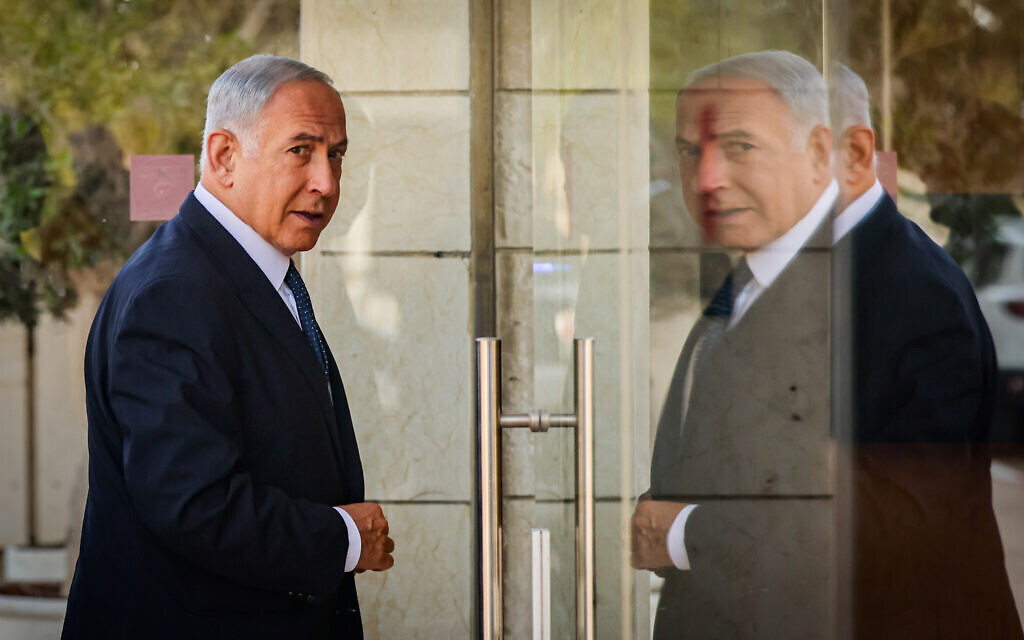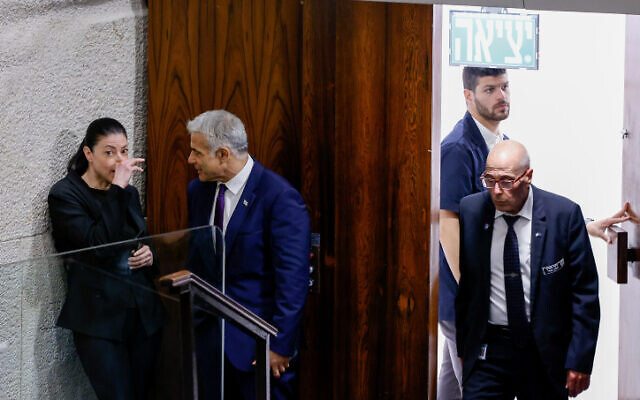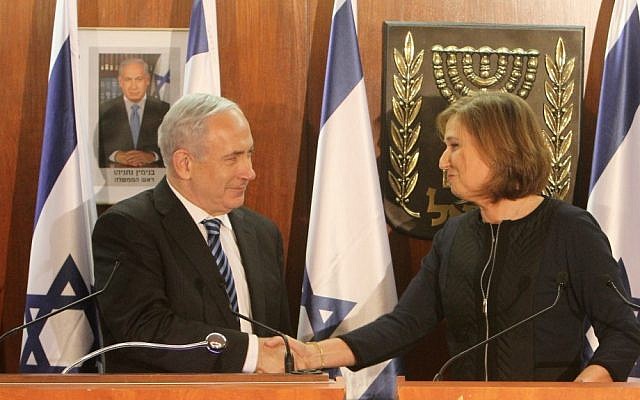Netanyahu, who mainstreamed Israel’s radicals, now the last obstacle to their agenda
The comeback PM will have no trouble assembling his coalition. The challenge will be reining in his allies, in the areas where he’d still want to, when he has no alternate partners
By DAVID HOROVITZ Today, TOI

Likud chairman MK Benjamin Netanyahu arrives for coalition talks in Jerusalem on November 6, 2022, after his bloc won a majority in the November 1 elections. (Yonatan Sindel/Flash90)
Benjamin Netanyahu, who has always been most comfortable having parties both to the right and left of him in his coalitions, may not see it as ideal to set up a government only of right-wing hawks, Orthodox nationalists and ultra-Orthodox representatives.
He will be well aware that such a government will breed immense resentment from Israelis elsewhere on the political spectrum for entrenching the exclusion of ultra-Orthodox youngsters from military service and subsidizing Haredi full-time Torah study and large families at taxpayers’ expense.
He will be dependent on ideological hardliners who constantly push for more aggressive policies regarding the Palestinians, potentially sparking deeper military confrontations.
He will want to avoid sparking despair or even an exodus of Israelis who don’t see a place for themselves in a country ruled by a coalition that is so at odds with their approaches to Judaism and to democracy, and are consequently reluctant to serve or send their children to serve in its army.
In some areas at least, he would prefer not to advance policies that risk deeply harming Israeli ties with the Diaspora and with key allies, undermining diplomatic support, damaging the economy, and inviting new heights of international criticism.
Netanyahu, remember, is no military adventurer. Unlike an overwhelming proportion of the incoming MKs from his bloc, he served in the IDF — served heroically — and personally knows the costs of war and conflict with the death of his beloved elder brother Yoni at Entebbe. And Netanyahu is a secular Jew, whose Jewish identity is not expressed in the rigorous observance of the Orthodox and the Haredim.
As Netanyahu begins the process of building his sixth Israeli coalition government, the unusual simplicity of the task belies its potentially drastic consequences
But as he begins the process of building his sixth Israeli coalition government, the unusual simplicity of the task belies its potentially drastic consequences: Netanyahu’s Likud, the far-right Religious Zionism, and the ultra-Orthodox Shas and United Torah Judaism parties together won a decisive majority in Tuesday’s elections — but no other party is remotely likely to join them. Even if he wanted them, no other party would consent to sit to Netanyahu’s left in government, his loyal partners would not sanction such an addition, and any such party would in any case have no significant leverage.
And thus it will fall to Netanyahu, increasingly hawkish himself, to try to moderate those demands of his allies and his own hawkish Likud slate that he still considers beyond the pale. Having ensured mainstream legitimacy for the Religious Zionism alliance — with its three component parties’ various radical demands for the expulsion of “disloyal Arabs,” the annexation of the entire West Bank without equal rights for Palestinians, Jewish prayer on the Temple Mount, a pushback against LGBT rights and more — it will now fall to Netanyahu to rein in their most radical agenda items, should he be so inclined.
Given that they know he has no coalition without them, this will constitute a formidable task.
But it will be him or nobody, especially if Israel’s judicial checks and balances are removed, as Religious Zionism proposes and this nascent coalition widely endorses.

Likud chief Benjamin Netanyahu (center) meets with UTJ head Yitzchak Goldknopf (second from left) and other party officials, with Likud negotiator Yariv Levin (right) in a Jerusalem hotel on November 6, 2022. (Courtesy)
A surprisingly comfortable victory
The Likud leader and his allies won an unexpectedly solid majority on Tuesday thanks to a combination of factors within his control and without.
He brokered the merger of the Religious Zionism, Otzma Yehudit and Noam parties because he feared Religious Zionism’s Bezalel Smotrich and Noam’s Avi Maoz might fail to clear the electoral threshold, wasting precious far-right votes, and had no compunction in ensuring the Kahanist disciple Itamar Ben Gvir’s return to the Knesset.
He may not have anticipated how potent an election draw Ben Gvir would become. And he could not have known that the National Unity party of Benny Gantz, with Orthodox candidates Chili Tropper and new recruit Matan Kahana available to reach out to non-extreme modern Orthodox Jews, would instead choose to play up its other new recruit, Gadi Eisenkot, an outspoken advocate of a two-state solution.
With its populist promises to restore Jewish Israelis’ sense of security, Religious Zionism, led by Smotrich (who did limited military service) and Ben Gvir (who was rejected by the IDF because of his extremist activities) won the votes of 1 in 5 serving soldiers, according to a calculation by Channel 12 news on Friday, more than National Unity, with its two ex-military chiefs of staff, one of them the serving defense minister who has been presiding over the most proactive IDF campaign for years against Palestinian terrorists in the West Bank.
Crucial to the Netanyahu bloc’s larger-than-most-expected majority, furthermore, were the delusions and the ineptitudes on the other side of the political spectrum. The Arab anti-Zionist Balad party appears to believe it achieved a stirring victory by scoring 138,093 votes after breaking off from Joint List partners Hadash-Ta’al to run solo. Since this represented only 2.9% of valid votes cast, and the threshold for Knesset representation is 3.25%, however, such “success” is pyrrhic.
Likewise, the insistent refusal of Labor’s Merav Michaeli to parallel the Religious Zionism technical merger and join forces with Meretz on the left, and outgoing Prime Minister Yair Lapid’s evident inability to find sufficient carrots or sticks to change her mind, meant Meretz also slipped below the threshold — with 150,715 votes, or 3.16% of the national vote.
The disunity among parties in the outgoing coalition saw Yesh Atid and National Unity vying for the same votes rather than focusing on the Netanyahu bloc. And Lapid seemed to run a defensive, understated campaign for fear of being accused of seeking to siphon off votes from Labor and Meretz — who accused him of doing so anyway.
The Likud leader and his allies won an unexpectedly solid majority on Tuesday thanks to a combination of factors within his control and without.
He brokered the merger of the Religious Zionism, Otzma Yehudit and Noam parties because he feared Religious Zionism’s Bezalel Smotrich and Noam’s Avi Maoz might fail to clear the electoral threshold, wasting precious far-right votes, and had no compunction in ensuring the Kahanist disciple Itamar Ben Gvir’s return to the Knesset.
He may not have anticipated how potent an election draw Ben Gvir would become. And he could not have known that the National Unity party of Benny Gantz, with Orthodox candidates Chili Tropper and new recruit Matan Kahana available to reach out to non-extreme modern Orthodox Jews, would instead choose to play up its other new recruit, Gadi Eisenkot, an outspoken advocate of a two-state solution.
With its populist promises to restore Jewish Israelis’ sense of security, Religious Zionism, led by Smotrich (who did limited military service) and Ben Gvir (who was rejected by the IDF because of his extremist activities) won the votes of 1 in 5 serving soldiers, according to a calculation by Channel 12 news on Friday, more than National Unity, with its two ex-military chiefs of staff, one of them the serving defense minister who has been presiding over the most proactive IDF campaign for years against Palestinian terrorists in the West Bank.
Crucial to the Netanyahu bloc’s larger-than-most-expected majority, furthermore, were the delusions and the ineptitudes on the other side of the political spectrum. The Arab anti-Zionist Balad party appears to believe it achieved a stirring victory by scoring 138,093 votes after breaking off from Joint List partners Hadash-Ta’al to run solo. Since this represented only 2.9% of valid votes cast, and the threshold for Knesset representation is 3.25%, however, such “success” is pyrrhic.
Likewise, the insistent refusal of Labor’s Merav Michaeli to parallel the Religious Zionism technical merger and join forces with Meretz on the left, and outgoing Prime Minister Yair Lapid’s evident inability to find sufficient carrots or sticks to change her mind, meant Meretz also slipped below the threshold — with 150,715 votes, or 3.16% of the national vote.
The disunity among parties in the outgoing coalition saw Yesh Atid and National Unity vying for the same votes rather than focusing on the Netanyahu bloc. And Lapid seemed to run a defensive, understated campaign for fear of being accused of seeking to siphon off votes from Labor and Meretz — who accused him of doing so anyway.

Yair Lapid and Merav Michaeli speak on the sidelines of the Knesset on June 22, 2022. (Olivier Fitoussi/Flash90)
It is being argued, including by expert pollsters, that had Labor merged with Meretz, and Balad not split away from Hadash-Ta’al, the election would have ended with 60 seats for the Netanyahu bloc and 60 for all his opponents. That would not have given Lapid a route to power, but it would have thwarted Netanyahu for a fifth time in less than four years, with unknowable consequences for his hold on the leadership of his party and bloc.
But the 60-60 assessment strikes me as extremely problematic. While it is reasonable to assume that Labor and Meretz running together would have scored several more than the four seats Labor managed alone, it’s not a certainty; Gideon Sa’ar’s New Hope merger with Gantz didn’t do much for the National Unity alliance’s showing. Some Labor voters might have been deterred from voting for a merged list by Meretz’s markedly more left-wing positions on the Palestinian conflict, by the role played by Meretz’s Ghaida Rinawie Zoabi in bringing down the outgoing coalition, and a host of other factors.
The Balad breakaway, meanwhile, plainly boosted Arab turnout — which rose to 53.2% from a predicted 40% or thereabouts earlier in the campaign — drawing in voters who would not have voted for the Hadash-Ta’al-Balad combination. It seems unlikely, therefore, that those three parties running together would have garnered as many votes as they did with Balad going solo.
Still, if 60-60 seems like an exaggeration, more unity of purpose and more effective organization in the anti-Netanyahu camp could plainly have reduced his bloc’s overwhelming (by recent Israeli standards) margin of victory, as the near-parity in the popular vote totals further underlines.
The Lapid camp did not want to campaign with the vicious ferocity employed by the other side — extending to Netanyahu’s cynical assault on Gantz’s IDF bona fides — but it also failed to match Netanyahu and Ben Gvir for energy and sheer relentlessness. As so often in the past, Netanyahu, ably assisted by all of his partners, simply wanted it more.
From most diverse coalition to most hardline
Helped back into power by his far-right and ultra-Orthodox allies, however, Netanyahu can build his coalition only with them, and cannot attract a potentially moderating additional component as he did in past years with the likes of Gantz, Lapid, Tzipi Livni and Ehud Barak.

Prime Minister Benjamin Netanyahu and Hatnua party leader Tzipi Livni at the joint press conference where Livni announced she was joining Netanyahu’s government as minister of justice, February 19, 2013. (Photo credit: Miriam Alster/FLASH90)
There is no question of Lapid ever partnering with him, as he did in 2013. Gantz chose to do so in 2020 at the height of the COVID crisis and swears blind that he will never do so again. Avigdor Liberman said Friday that he had firmly rebuffed post-election Likud overtures.
It is not inconceivable that Netanyahu could pick up a defector or two from the soon-to-be-opposition ranks, but it’s not an extra vote or two he would need. It’s a full-fledged party that he might have sought to woo, in the spirit of his election night pledge to “heal the rifts” and “look after all the citizens of Israel” — or at least to slightly diversity the ideological mix. He might just have attempted to impose this additional party on his partners in deference to the deep Israeli divide all these elections have shown — a divide he had hitherto exploited.
But there are no such parties — no more potential, unscarred allies remaining for Netanyahu to utilize.
After the demise of the most diverse coalition in Israeli history, we are now about to witness the most hardline coalition in Israeli history
After the demise of the most diverse coalition in Israeli history, therefore, we are now about to witness the most hardline coalition in Israeli history. The most Orthodox. And possibly the most ideologically uncompromising.
Several analysts have ventured to suggest in recent days that, once seated in their ministerial fiefdoms, the likes of Smotrich and Ben Gvir will melt a little. “What you see from here is not what you see from there,” as Ariel Sharon, who made that kind of shift when installed as prime minister, once explained.
But this seems particularly improbable in the case of the leaders of Religious Zionism.
Smotrich forced Netanyahu into the opposition last year because he wouldn’t tolerate any reliance for a majority on the support of the conservative Islamist party Ra’am. Ben Gvir has been peddling his brand of provocation politics since he brandished the Cadillac symbol from prime minister Yitzhak Rabin’s car shortly before the assassination, exactly 27 years ago.
Victorious, and dependent
With his fifth attempt, Netanyahu has extricated Israel from its political paralysis.
He might — should he choose to break his slew of pledges to the contrary — utilize the Knesset majority he now has to extricate himself from his legal problems.

Religious Zionism leader Bezalel Smotrich arrives for coalition talks with Likud chief Benjamin Netanyahu, in Jerusalem, November 6, 2022. (Yonatan Sindel/Flash90)
Smotrich said before the elections that he would not join the coalition unless it advances his program to render the judiciary subservient to the political majority of the day — a program that includes abolishing the fraud and breach of trust charge common to all three of Netanyahu’s corruption cases, and radically limiting the High Court’s powers to override legislation deemed non-democratic. While Smotrich said his proposed legal changes would not be retroactively applied to Netanyahu’s trial, Ben Gvir said the opposite — promising to advance legislation barring the prosecution of a serving prime minister, and to have it applied retroactively to extricate Netanyahu.
In this specific area of judicial “reform,” manifestly of great personal interest for Netanyahu, the unstoppable clout of this particular coalition could therefore prove highly beneficial. In many other areas, however, his allies’ agendas will be less convenient.
He will find himself on the moderate edge of a radical coalition, challenged by his partners when he tries to rein them in, and presiding over a bitterly divided nation.
The cries are already going up: Heaven forbid that you give Smotrich a senior office of state, least of all defense. Don’t capitulate to the Haredim and widen the ultra-Orthodox secular rifts.
And, most plaintive of all, don’t entrust pistol-waving Ben Gvir with authority over the police. This is a man who was convicted of incitement to racism. How can he be allowed to set the agenda for the forces of law enforcement? How can he be allowed to participate in security briefings regarding Jewish extremists he has allied with and in some cases defended as a lawyer? How can he be allowed to set policy on the Temple Mount?

Religious Zionism MK Itamar Ben Gvir on a campaign stop in Sderot’s open market on election day, November 1, 2022. (Jacob Magid/Times of Israel)
Think of your legacy, the incoming prime minister is being urged. Think of the Israelis who didn’t vote for you, whom the departing alternate prime minister Naftali Bennett is seeking to assure that Tuesday’s elections did not mark “the end of the country.” Think of Israel’s wider interests.
But it’s too late for that now. Netanyahu’s political opponents sought to boot him out of politics once and for all, setting up a government united only in that goal. But he outlasted, outmaneuvered and outcampaigned them, shamelessly mainstreaming some of Israel’s most extreme ideologues in the process.
And now only Netanyahu — victorious but in their debt, self-interested in some of their “reforms,” and with no other forces to call upon — stands between them and their radical agenda for Israel.
Related:
Netanyahu, Ben Gvir win marks the elevation of Jewish Israel above democratic Israel
With rise of Ben Gvir and Smotrich, Israel risks a catastrophic lurch to extremism
Why this election is a defining moment for Israel, how it’s run, what it stands for
Some of Netanyahu’s most bitter adversaries have smoothed a path for his return
Beware Itamar Ben Gvir, rising far-right star with a destructive vision for Israel
No comments:
Post a Comment